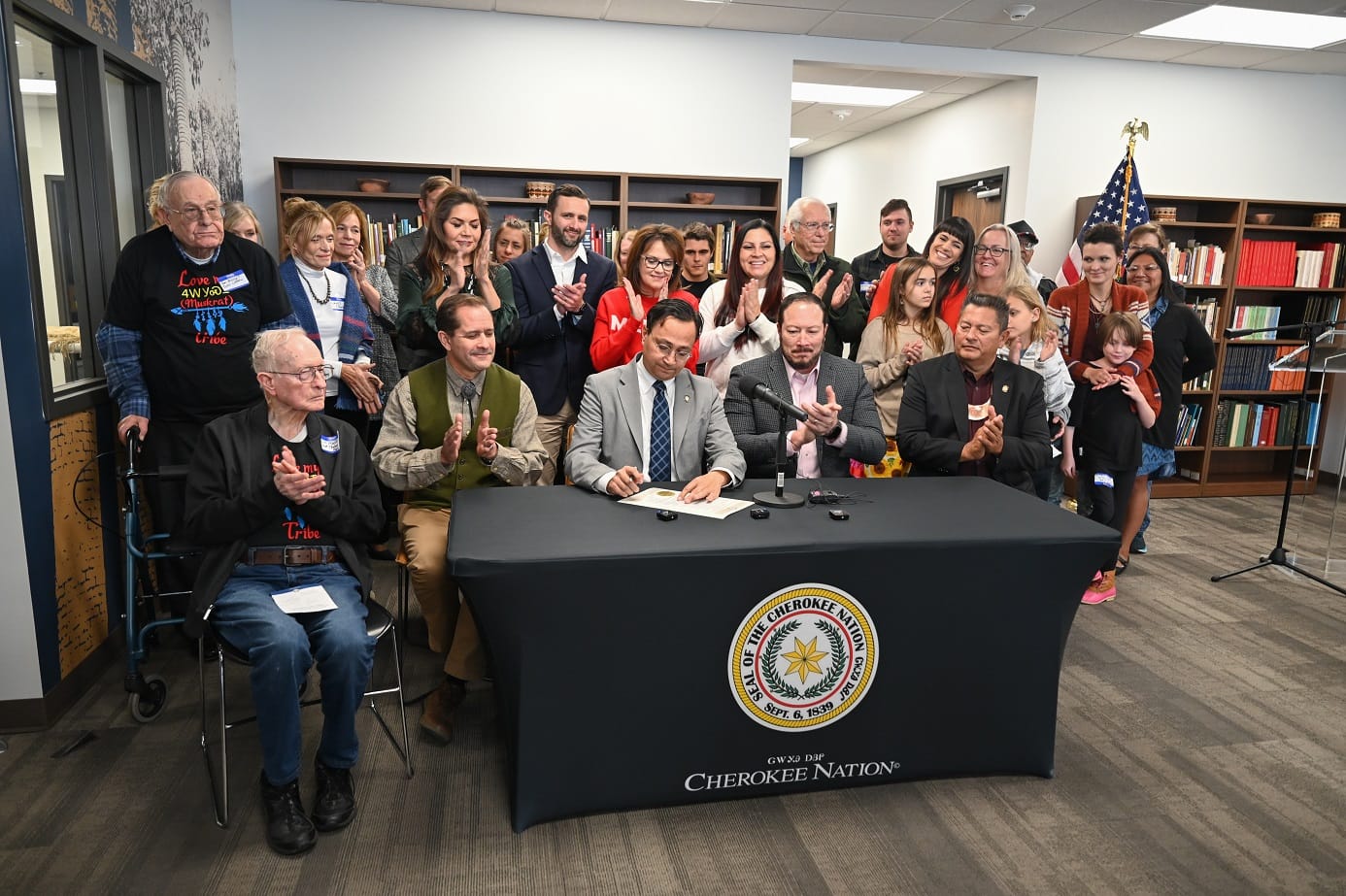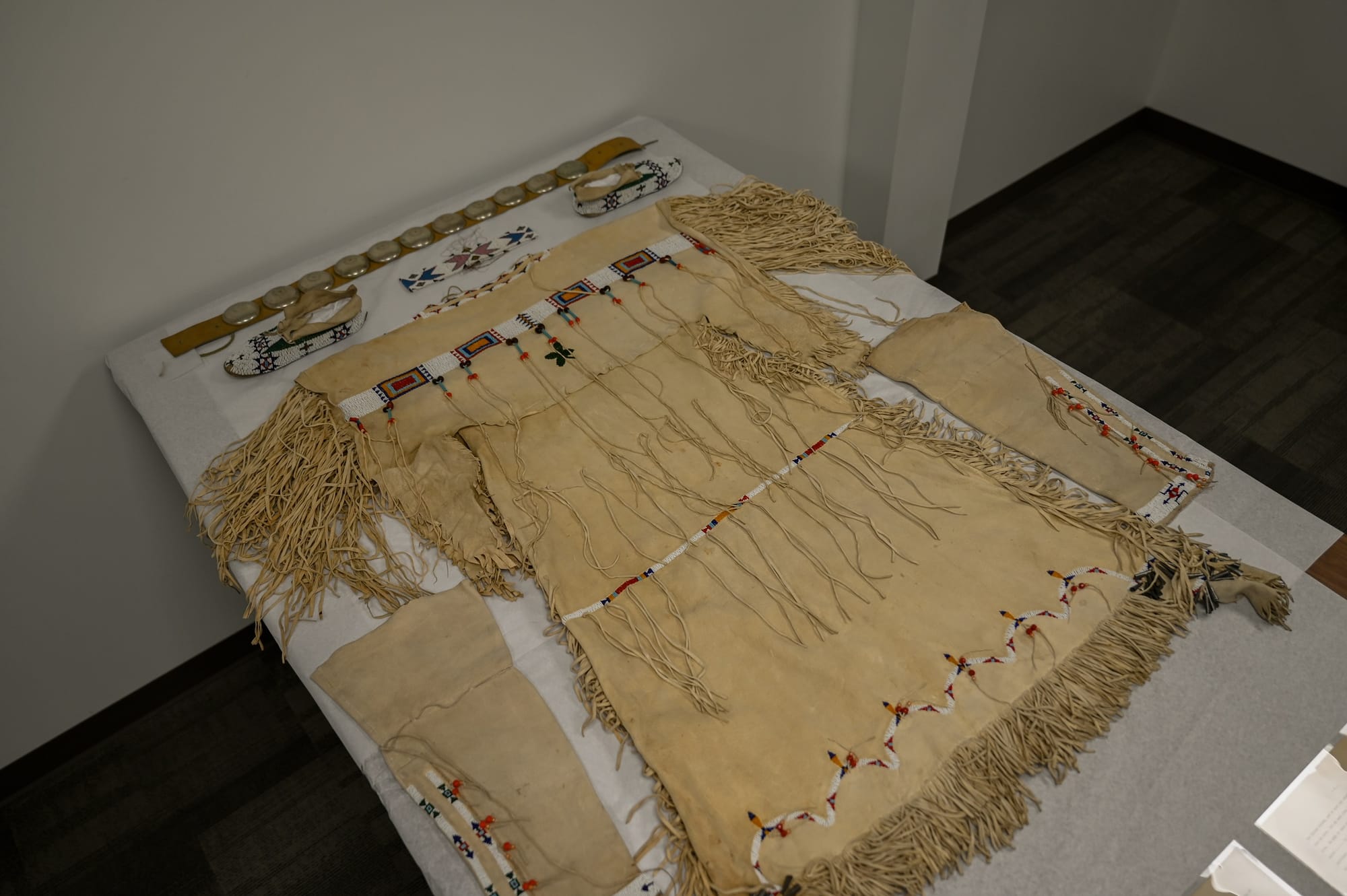
Cherokee activist honored for lifetime achievements advancing social justice
TAHLEQUAH, Okla. – One hundred years ago, 27-year-old Ruth Muskrat Bronson stood in the Rose Garden at the White House in a plea for social justice and Indian rights. Representing Native American leaders from the Committee of 100 on Indian Affairs, Bronson presented a copy of Gustavus Elmer Emmanuel Lindquist′s book “The Red Man in the United States” to President Calvin Coolidge, accompanied by a compelling speech on Indian policy.
On the centennial anniversary of that historic event, Cherokee Nation Principal Chief Chuck Hoskin Jr. and Deputy Chief Bryan Warner signed a proclamation declaring Dec. 13 as Ruth Muskrat Bronson Day in Cherokee Nation.
"In her era, Ruth Muskrat Bronson stood as a beacon of resilience,” said Cherokee Nation Principal Chief Chuck Hoskin Jr. “Her unwavering efforts helped establish a stronger foundation for the recognition of tribal governments and more justice for Native people nationwide. And she opened so many doors that resulted in expanded educational opportunities for Indian Country. Her enduring legacy is a testament to the profound impact one single individual can have on shaping a brighter future for generations to follow."
A Cherokee Nation citizen, educator and poet, Bronson had an incredible impact throughout some of the most challenging and influential times in Native American history.
According to an article by The White House Historical Association, “The December 1923 Native American visit to the White House and Ruth Muskrat’s speech may have influenced Coolidge to support and sign the 1924 Indian Citizenship Act on June 2.”

Her rise to fame began just a year before her historic presentation, when she was selected as one of the first Native American women to attend the International Youth Conference as part of a YWCA delegation. Her passion for activism gained the attention of the national press and opened the door to what would be a long and meaningful career.
Bronson worked tirelessly for decades to advance social justice and increase educational opportunities for all Native people. While working for the Bureau of Indian Education in the 1930s, she established the American Indian Higher Education Scholarship Program, increasing Native enrollment up to 300%.
She was well known as an early leader within the National Congress of American Indians from 1945-1955 and served as its first executive director. Today, this organization stands as the oldest, largest, and most representative American Indian and Alaska Native organization, serving the broad interests of tribal governments and communities.
“Her national leadership played a pivotal role in the early NCAI days. That advocacy helped propel NCAI to the forefront of fighting for Native rights and tribal sovereignty,” said Deputy Chief Bryan Warner. “She embodied the values of the organization with her steadfast commitment, and as a fellow Cherokee, that is something we can all admire and respect.”
As part of the celebration, Bronson’s family gathered with Cherokee Nation officials to transfer Bronson’s dress, speech and moccasins to the Cherokee National Archives at the Cherokee National Research Center in Tahlequah.
“It is our family’s honor to donate Ruth’s items to our tribe, the Cherokee Nation,” said Jennifer Loren, the great-great-niece of Bronson, senior director of Cherokee Film and host of OsiyoTV. “We only wish she were alive today to see how far we’ve come. All of her hard work paid off, and we know she’d be so proud of where we are today as a people.”
“I think Ruth's impact on her four grandchildren can be seen in dedication to education and advocacy. Her legacy lives in each of us as we have all had lengthy careers in education, the arts and social services,” said Andrew Tidrick, grandson of Ruth Muskrat Bronson. “Ruth demonstrated unmatched grit and determination that were passed on through our mother, Dolores, and instilled in each of us. That foundation unites us as family and empowers us to persist. Knowing these items will be safely kept and shared with future generations is the greatest gift for our family and the best way to ensure Ruth’s legacy continues to thrive.”
The Cherokee National Research Center safeguards more than 11,000 historic Cherokee-related documents and cultural artifacts within its 5,000-square-foot, fireproof and storm-resistant vault with industry-leading environmental controls. The state-of-the-art facility is serving as a temporary home to the Nation’s foremost collection of historic Cherokee-related documents and cultural artifacts from the 1700s through present day.
More information about Bronson’s incredible impact can be found online at osiyo.tv/ruth-muskrat-bronson/.



